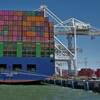U.S. Grain Prices Soar as Floods Shut Waterways
U.S. grain farmers scrambled to find shelter for their crops and handlers hunted for alternative transportation routes, as widespread floods shut waterways from Illinois to Missouri and spurred a surge in physical prices of corn and soybeans.
The sudden jump in prices could complicate a months-long stand-off between farmers who are unwilling to sell their bumper crop at low prices and buyers who have refused to budge on their cash offers amid plentiful supplies.
It could also further curb export demand, with U.S. traders struggling to compete with their cheaper Latin American rivals.
Cash premiums for soybeans in the U.S. barge market, jumped to as high as 70 cents per bushel on Wednesday, their loftiest since mid-November as the rapidly rising waters forced the Coast Guard to shut a five-mile section of the Mississippi River, including the harbor at St. Louis, traders told Reuters.
Surcharges for corn hit 49 cents on Wednesday, up almost a third from 37 cents a week ago and the highest in nearly three weeks. Premiums are paid on top of the benchmark futures prices for physical delivery.
Fear of flooded fields and soggy grain piles had some farmers rushing to sell their grains to local buyers, or deciding it would be worth the monthly fees to move it off their farms and store it at grain elevators with bins built on higher ground.
Some grain elevators in southeastern Missouri and southwestern Illinois were having a tough time keeping up with truck traffic this week, according to farmer tweets.
"Lines are crazy today. U would think it's ten dollar corn' quote of the day while hauling from potential flooded area to elevator," tweeted Danny Brewer, a corn, wheat and soybean farmer in Southwestern Illinois.
Further south, near the U.S. Gulf Coast, some elevators and cooperatives were so worried about interruptions to barge grain deliveries they tried to secure local grain supplies by offering to pay more for them. It is not known if they found any buyers.
Cash bids for soybeans rose by 10 cents per bushel, and corn bids increased by 5 cents per bushel, at some grain handlers in the Louisiana and southern Mississippi River areas, said Mike Steenhoek, executive director of the Soy Transportation Coalition.
"Everyone's coming up with contingency plans," Steenhoek said. "The elevators and cooperatives, they have all these orders they're obligated to fulfill. ... They're worried about filling these orders."
Even food manufacturers may be feeling the pain of the sudden flooding.
Two Illinois flour mills near the Mississippi River operated by Ardent Mills, the largest U.S. flour miller, were closed because of flooding.
Ardent, operated jointly by Cargill Inc, ConAgra Foods Inc and CHS Inc, told Reuters on Wednesday it is working to supply customers' needs. But the mills in Chester and Alton will remain closed until the waters recede, a spokeswoman said.
That is unlikely to happen this week. On Wednesday evening, the U.S. Coast Guard said high waters will force it to close a 76-mile (122.3 km) stretch of the Mississippi River downstream from Chester, near one of the mills.
TRAINS, BARGES
With much of the river north of St. Louis already shut for the season, grain companies have been unloading trains at St. Louis and then using barges bound for the Gulf.
With the harbor now temporarily closed, shippers are diverting trains from St. Louis to other terminals in Cairo and Metropolis, both in Illinois.
Shippers there are loading barges on the lower Ohio River, and then traveling to a still-open part of the Mississippi River at the confluence at Cairo, traders said.
On Wednesday, waters were continuing to rise on the Ohio and on the Mississippi south of Cairo, even as the waters had started to recede further upstream.
Still, said Christopher Pince, public affairs officer with the Coast Guard in Louisville, Kentucky, "we're dealing with extremely high waters so the Coast Guard is recommending (vessels) proceed with extreme caution."
Reporting by P.J Huffstutter and Michael Hirtzer














